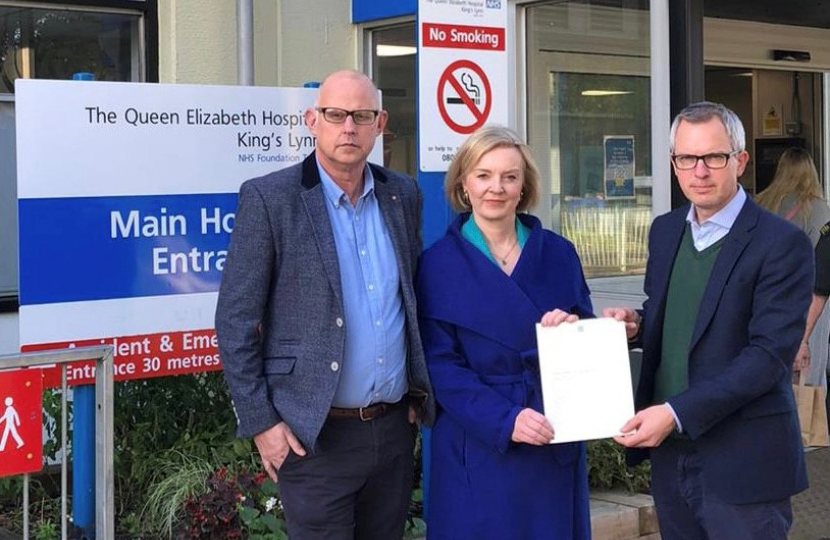Local MPs and council leaders have written to the Health Secretary saying now is the time for urgent action and confirmation that the QEH will be one of the government’s new hospitals given its serious RAAC concrete issues.
Three of the signatories, James Wild MP for North West Norfolk, Liz Truss MP for South West Norfolk, and Councillor Stuart Dark, Leader of the Borough Council were at QEH again today to demonstrate their commitment to a new hospital. They met with Acting Chief Executive Alice Webster, and Deputy Chief Executive, Laura Skaife-Knight to review the campaign.
In the letter, they welcome the Health Secretary’s recognition of the huge concerns about RAAC issues, the need for urgent attention, and his commitment to deliver the government’s pledge to eradicating RAAC from the NHS. Rt Hon Steve Barclay’s comments follow his visit to QEH in July with the MP for North West Norfolk, James Wild, to talk to the Trust leadership, staff, and patients and see the 3,000 timber and steel props firsthand.
At the Autumn Statement the Chancellor confirmed the government’s commitment to the new hospitals programme and with decisions expected shortly this letter is the latest effort to secure a new hospital after three years of campaigning.
The compelling case for a new hospital has repeatedly been by raised by local MPs in questions and debates in the House of Commons, meetings with Prime Ministers, Health Secretaries, the Chancellor and Treasury ministers, and several visits by ministers to QEH. In addition, the leaders of King’s Lynn and West Norfolk Borough Council and Norfolk County Council have been strong supporters of the campaign and ensured the support of both councils for the new hospital. There is strong local support from the community and more than 12,500 local people signed a petition in support of the new hospital.
Commenting on the letter, James Wild MP said:
“Over the last three years I have been campaigning with the backing of other MPs, local councillors, and strong community support for a new QEH hospital. The Health Secretary has rightly prioritised resolving the RAAC issues facing QEH. Now patients and staff need an urgent decision confirming the new hospital fit for the future that is so desperately needed. The time for waiting is over.”
Rt Hon Liz Truss MP for South West Norfolk:
“Everyone who uses, works or visits the Queen Elizabeth Hospital knows that the main building urgently needs replacing. Last week I visited the hospital and met the team doing their utmost in difficult circumstances. Today James Wild MP, I and community leaders are calling for urgent action from the Health Secretary to commit to a new build hospital. This is vital for my constituents.”
Stuart Dark MBE, Leader of the Borough Council said:
“I and the Borough Council have been in lockstep with the QEH hospital’s Senior Leadership Team and our MPs throughout. We have been supporting and magnifying the bid and key messages and highlighting the dire need for a new hospital and the strength of community concern and support to decision makers at key stages. This has included the Borough’s face to face lobbying of relevant Ministers and Secretaries of State, formal letters, initiation and support of the petition which gained such wonderful community backing and bringing in influential partners like Norfolk County Council and others to the cause. A modern, safe 21st century hospital, capable of supporting patients, visitors and brilliant staff is something we all need and must have. ”
Following the Health Secretary’s comments about RAAC hospitals at the NHS Providers Conference last week, the letter urges Steve Barclay MP to act now given QEH end of life date:
“Your speech at the NHS Providers conference acknowledging the huge concerns about RAAC issues, the need for urgent attention, and your commitment to deliver the government’s commitment to eradicating RAAC from the NHS estate has been warmly welcomed. Experts have advised QEH that the hospital’s end of life is 2030 due to the RAAC. So now we need to see urgent action and confirmation that QEH will be one of the new hospital schemes.
The MPs and council leaders highlight how QEH’s bid for a single-phase rebuild along with other RAAC hospitals – James Paget and West Suffolk – offers the potential for schemes that are built faster, represents better value for money, and are based on net zero principles:
“Standardised designs can reduce construction time, deliver better value for money, and integrate environmental features. QEH is ready to help lead with that approach by utilising Modern Methods of Construction and Net Zero principles, working closely with the James Paget and West Suffolk RAAC hospitals in the region that are already part of the programme.”
Reflecting the local concern at the delay in decisions which were originally due in the spring, the MPs and other signatories say:
“Patients and staff are extremely frustrated at the delay in decisions which were due at the beginning of this year and have been repeatedly pushed back. Your public recognition of the need for urgent attention is therefore very important and we trust that you will prioritise dealing with RAAC issues at QEH and take the much needed and urgent action of confirming that QEH will be one of the government’s new hospital schemes.”
Full text of letter:
Rt Hon Steve Barclay MP
Secretary of State for Health and Social Care
Department for Health and Social Care
Dear Secretary of State,
New hospital programme – Queen Elizabeth Hospital, King’s Lynn
We are writing further to extensive previous correspondence, meetings, parliamentary questions and debates, and ministerial visits over the last three years to urge you once more to include the Queen Elizabeth hospital (QEH) in King’s Lynn in the government’s new hospitals programme given its serious structural issues and the need for patients and staff to have a hospital fit for the future.
As you know, the QEH is over 40 years old having been built to last only 30. Around 80 per cent of the estate is covered in deficient Reinforced Autoclaved Aerated Concrete (RAAC) planks. QEH is the most propped hospital in the country with over 3000 timber and metal supports holding up the cracking roof. In the summer, three operating theatres had to close due to safety concerns causing considerable concern to patients and staff and currently theatres are closed as part of failsafe work. RAAC is an ongoing risk to safety and the Trust’s risk register has a red rating for “a direct risk to life and safety of patients, visitors, and staff due to the potential of catastrophic failure of the roof structure due to structural deficiencies.”
Therefore, your speech at the NHS Providers conference last week acknowledging the huge concerns about RAAC issues, the need for urgent attention, and your commitment to deliver the government’s commitment to eradicating RAAC from the NHS estate has been warmly welcomed. Experts have advised QEH that the hospital’s end of life is 2030 due to the RAAC. So now we need to see urgent action and confirmation that QEH will be one of the new hospital schemes.
The new hospital programme offers a once in a generation opportunity to transform the hospital for patients and staff from across Norfolk, Lincolnshire, and Cambridgeshire served by QEH. The Trust has submitted a strong case for a single-phase new build to replace the decaying and ageing estate with a modern hospital fit for the future and able to meet demand in areas with significant housing growth.
You rightly focused in your speech – and during the July visit to QEH that we are very grateful that you prioritised - on the importance of standardised designs to reduce construction time, deliver better value for money, and to integrate environmental features. QEH is ready to help lead with that approach by utilising Modern Methods of Construction and Net Zero principles, working closely with the James Paget and West Suffolk RAAC hospitals in the region that are already part of the programme.
A new QEH hospital is the priority project for the NHS East of England and public support for a new hospital for King’s Lynn and West Norfolk is very strong with 12,500 people having signed a petition in support. It is an anchor institution employing 4,000 people. Local MPs representing hundreds of thousands of constituents working at and using the hospital, local authorities, other key partners, and people in West Norfolk and beyond fully back the case for a new hospital.
Having come out of special measures earlier this year, QEH and its staff are delivering better care. A new hospital is an important element of continuing that improvement and supporting QEH’s ambition to be the best rural District General Hospital. Experts have advised QEH that the hospital’s end of life is 2030 due to the RAAC. By including QEH in the programme, the inevitable need for replacement will become a funded part of the capital investment programme rather than an unplanned demand.
In addition to the RAAC issues, the design of the hospital does not meet modern care pathways, there are too few consulting rooms, poor co-location of services, and ward sizes that increase infection control risks. In short, it needs to be replaced.
Patients and staff are extremely frustrated at the delay in decisions which were due at the beginning of this year and have been repeatedly pushed back. Your public recognition of the need for urgent attention is therefore very important and we trust that you will prioritise dealing with RAAC issues at QEH and take the much needed and urgent action of confirming that QEH will be one of the government’s new hospital schemes.
We would welcome the opportunity to discuss the proposal to deliver the new hospital by 2030 that patients, staff, and local communities need.
Yours ever,
James Wild MP
Rt Hon Liz Truss MP
Rt Hon Sir John Hayes MP
Richard Bacon MP
Jerome Mayhew MP
Councillor Stuart Dark, Leader of the Borough Council of King’s Lynn and West Norfolk
Councillor Andrew Proctor, Leader of Norfolk County Council
Councillor Sam Chapman-Allen, Leader of Breckland Council
Sir Jeremy Bagge Hon Alderman of King’s Lynn & West Norfolk Borough Council




